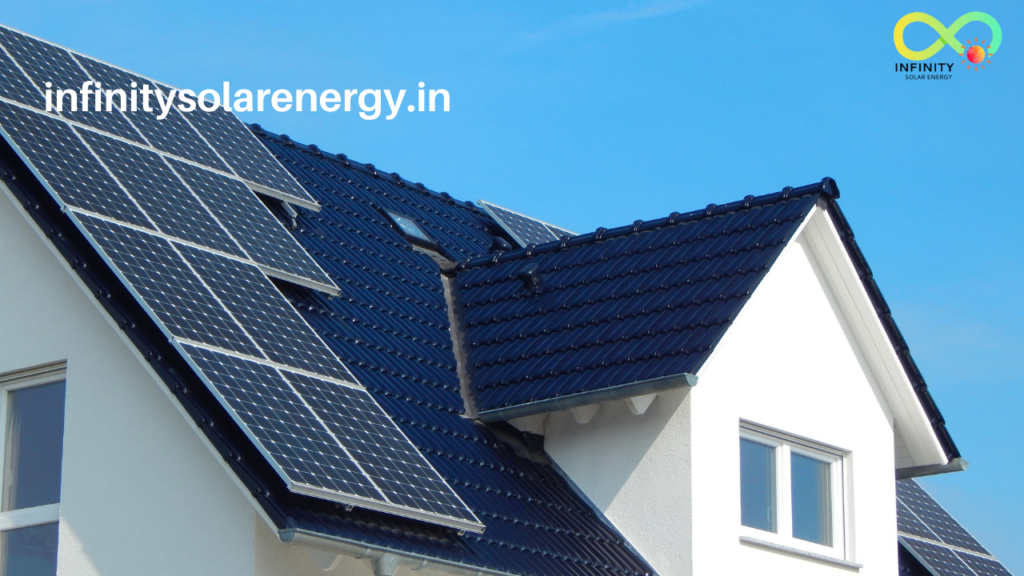Solar Panel Basics || Solar Panel for Home
One type of solar panel for home is known as a Concentrated Solar Power (CSP) solar panel. This type of solar panel requires space for a large heating, cooling, or electric-generating device that heats the photovoltaic cells within the panel to generate electricity. There are also systems for creating steam for industrial use. Innovative thin-film solar panels, made from silicon or glass, are a tiny fraction of the size of conventional panels and are used in portable and domestic applications.
However, they are more expensive than conventional panels. An inverter converts the DC power generated by solar panels into AC. With an inverter, you can power devices like fluorescent lights, TV’s, and hair dryers. Also, some inverters convert DC to AC to charge batteries.
contact infinity solar energy for more details
Why install solar panels || Solar Panel for Home
The U.S. Department of Energy (DOE) says the benefits of solar energy for you and your family include: You’ll enjoy lower utility bills: The DOE says that a residential system could cut energy costs by up to 60% compared to an average U.S. household. Low-priced electricity: In addition to lowering your utility bills, your electricity will be cheaper than electricity from most conventional sources, which are subject to higher taxes and tariffs. Energy independence: Running an electric vehicle off a solar system will require very little extra energy, especially at night.
Aeration of the climate: “Solar panels in the ground directly remove CO2, greenhouse gases, and other pollutants that contribute to global warming,” according to The American Council for an Energy-Efficient Economy.
What to look for when choosing a solar panel || Solar Panel for Home
There are many different types of solar panels, and you’ll need to evaluate your home’s environment before selecting the right one for your location and electric rate. The best panels are ones that have a high efficiency. The higher the efficiency of the solar panels, the more power they generate. For solar panels to work optimally, they have to be placed in the sun most of the time. In areas that have less than optimal weather, solar panels are more cost-effective than weatherized solar panels.
While a cloudy day doesn’t affect a solar panel’s performance, it can decrease the energy output by 30 to 40%. The panels’ efficiency also varies based on the location in which they’re installed.
How to choose the right solar panel for home

After researching and investigating several solar panel options, here is a checklist of things to consider when evaluating your choice. Note that there is no standard module; every module is designed and built to meet the demands and needs of each manufacturer. * Additional charges may be incurred to connect to the electrical grid.
For this reason, you should compare the total cost of purchase with the total cost of connection. 30W – This is the most commonly available solar panel for consumers in the U.S. 30W – This is the most commonly available solar panel for consumers in the U.S. 75W – A step up from 30W, this panel provides the best power conversion efficiency at 1.7%. 75W – A step up from 30W, this panel provides the best power conversion efficiency at 1.7%.
The benefits of installing photovoltaic panels || Solar Panel for Home
Solar panels provide an almost endless supply of clean electricity. They allow you to completely power your home with electricity generated from the sun’s energy. These high-efficiency devices use photovoltaic cells to convert sunlight into electricity. PV cells are solar cells that use semiconductors to convert energy from light to electricity. Solar panels that generate more electricity than required to power the household electrical loads are called “net-metered,” or “grid-tied,” solar systems.
A solar panel helps to reduce your energy bill by approximately 30 to 40% (as much as $15,000 on a $150,000 house). They increase the property value of your home because they bring curb appeal with minimal upkeep cost. Some homeowners like to earn passive income from their solar systems.
Conclusion || Solar Panel for Home
In recent years, solar technology has improved to the point where many solar panels can provide more power per square foot than a conventional home uses from its electric utility company. If you’re considering adding solar panels to your home, we recommend you do your research before making a final decision. Here are a few things you should consider: How many square feet of roof space you have . You should base your decision on how much power you need for your home’s electricity use and how much room your panels will provide for other electrical equipment.
A 1,000-watt solar array of 30-gallon (140-liter) solar panels might provide as much as 30% of your home’s electricity. However, that amount could be too small for larger homes or even entire cities.

